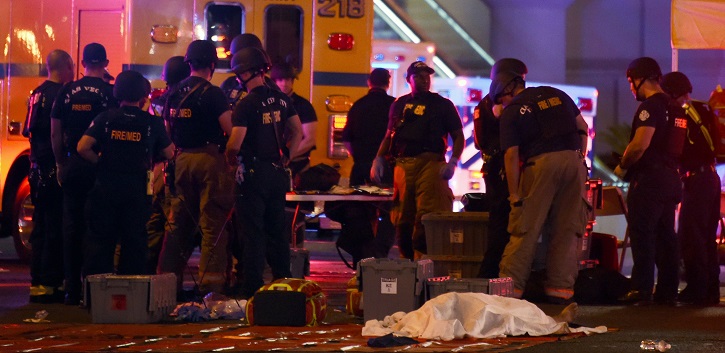Op-ed: How to stop America’s cycle of carnage

Another day, another mass shooting in America. This time the carnage took place at a music festival on the Las Vegas Strip, where more than 50 people have been killed and many others injured. Some of them critically.
The authorities have identified the the gunman as a 64-year-old Nevada resident Stephen Paddock who they believe acted alone and is not associated with any militant group.
When faced with unspeakable agony, it is only normal to seek a rational explanation, or even better to be casting blame. As American philosopher Judith Shklar once said, we cannot accept a ruleless world in which things just happen to us. It is psychologically unthinkable that we can desist from casting blame upon something or someone, in fact even blaming ourselves is more tolerable than folding up in front of so absurd a life.
As we try to make sense of another incident of innocent lives being cut short, paradoxically it would be more comforting to our sense of logic if this tragic incident had something to do with organised terrorism. But does not appear to be the case. Terrorism is a terrible blight on our civil society and livelihood, but there are other sources of evil, many of which are easier to prevent. The origins of this latest incident of violence go much deeper, and are unsurprisingly obvious.
Violence is as American as apple pie. This is the country that in recent years has witnessed more shootings in high schools and universities than any other country in the world: since 2010 there have been more than 100 incidents, which caused more than 100 deaths. This is also the country that has had to come to terms with a bombing by extreme right-wing activists on a federal building in Oklahoma in 1995 that claimed 168 lives and injured more than 680 people. And of course, this is the country that still believes in a constitutional (if not divine) right to bear arms.
Vittorio Bufacchi: How to stop America's cycle of carnage https://t.co/rZYeprVPy5
— Irish Times Opinion (@IrishTimesOpEd) October 2, 2017
Violence begets violence
Violence poses many puzzles that are yet to be fully understood: morally, politically and psychologically. Yet there are two aspects of violence that most reasonable people would not deny. First, that violence begets violence. Secondly, that acts of violence increase with the opportunity to use violence, and its perceived impunity.
Violence feeds on itself. Countries that have experienced a high incidence of political conflict inevitably retain the violence long after peace accords have officially been signed. This is true of all the countries that have been scarred by bloody civil wars and brutal internal struggles, not only in Africa, Asia, and Latin America, but also in Europe, as the recent history of Northern Irelandtestifies. In order to stop people from using violence we must first stop using violence against them. After all, we all know that it is not by inflicting corporal punishment on children that we teach them not to be violent.
Historically the way that America has dealt with violence is by sanctioning even more violence. The death penalty is America’s response to violent crime, and the American way of dealing with the terror of a terrorist attack in 2001 was to legitimise torture. Given its widespread culture of violence, the only surprising aspect of this latest incident of mindless murderous violence is that our collective response is to be surprised.
It is also trivially obvious that one is more likely to use violence if one has access to the means of violence. That is precisely why America is strongly opposed to North Korea developing a nuclear programme: Kim Jong-un can only use North Korea’s nuclear arsenal if they have a nuclear arsenal to use in the first place. Similarly, having easy access to guns clearly makes it easier for deranged lone-wolves to go on shooting sprees, in schools, universities, political rallies or concerts.
The only way to fight the culture of violence in America is to break the cycle of violence, to change the rhetoric of how the right to bear arms defines a nation’s identity. For this to occur, it is imperative that politicians lead from the front. Sadly that is not likely to happen in the United States, at least not in the foreseeable future.
Americans are unlikely to give up on an ideology that breeds violence, misery and tragedy, and they will keep baking apple pies. Similarly it is not by tolerating bigotry and hatred that we protect the right to free speech; on the contrary our most cherished and fundamental rights are devalued by the failure to condemn in the strongest possible terms acts of hate, chauvinism, xenophobia, racism, and anti-Semitism.
Notwithstanding his best efforts, even Barack Obama, during his eight years in the White House, was powerless to curb the disproportionate political muscle of the National Rifle Association of America. It is statistically more likely for unicorns to be found roaming the green hills of Ireland than for president Donald Trump to show some common sense on this issue. In the meantime, we have no choice but to put up with a random, arbitrary world.
Vittorio Bufacchi is Senior Lecturer in philosophy at University College Cork, and author of ‘Violence and Social Justice’ (2009) and ‘Violence: A Philosophical Anthology’ (2011).
Originally published in the Irish Times (October 2).
For more on this story contact:
Lynne Nolan, Media & PR Officer, UCC: 087 210 1119.
